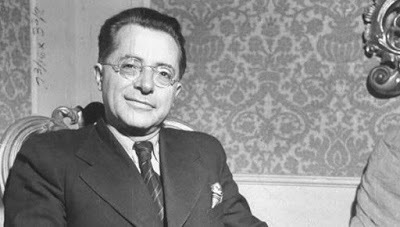Machiavellism, transformism and Togliatt

Renato Mieli, in Togliatti 1937, captures well the synthesis between Machiavellism and transformism, which in the post-war period from 1945 onwards was mainly introduced in Italy by the PCI.
"The Italian Communist leaders [who were in Russia during the Stalinist purges] possessed a particular quality that made them less vulnerable than others: political ductility. By instinct, perhaps more than by calculation of prudence, they knew how to adapt themselves promptly and with discretion to Stalinist politics, of which they shared the official line, ignoring what was contradictory and conflicting in practice. They dosed their consent so as not to provoke Stalin's diffidence, but to avoid, at the same time, making himself co-responsible for his policy in the most brutal aspects."
Such a a similar system experimented in Russia - the subtle art of adapting to the situation, being a lion and a fox of Machiavellian memory, avoiding the risks that a little less malleable position would entail - Togliatti reimplanted in the Italian culture when he arrives at Neaples.
In fact, the first thing Togliatti did was to found the journal "Rinascita", which came out in July 1944. And in the first issue, Benedetto Croce the most important representative of liberal Italian culture was violently attacked.Togliatti also moved personal attacks. But there was a reason. With those attacks, Togliatti sent a message, he wanted to make the Italian communists understand who was the enemy to fight on a cultural and ideological level.Another important message Togliatti sends to Italian intelligentsia on the day of the killing of Giovanni Gentile, claiming the killing of the philosopher. He defines the filosofo as a criminal, and claimed the killing as an act of justice and fruit of the will of the Italian people. By killing Gentile Togliatti warned all academics and intellectuals (Gentile unlike Croce had power in universities and publishing houses). The message was this: things have changed now; now we are in charge, but we can purify you, if you, fascist and gentiliani intellectuals, come over to our side, everything will be forgiven to you and you will be redeemed. Intellectuals, a fearful and servile race, rushed en masse.From these two events, Italian culture (almost every intellectual was fascist until 1945) moves to the left, as well. Fundamental in this shift is The Partito d'Azione ideology. The basic idea of the action party was this: liberalism had to find more advanced balances, liberalism had to be anti-fascist but not anti-communist, and therefore attention and dialogue had to be opened with the communists, with the aim of bringing them on more democratic positions. This vision will determine the Italian political and cultural ideology from the post-war period onwards to the present day, according to the axiom that one can be anti-fascist but not anti-communist, because being anti-communist means being fascist.
Published on February 18, 2020 07:08
No comments have been added yet.



